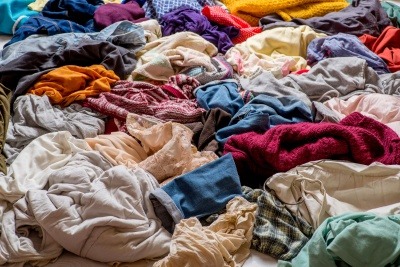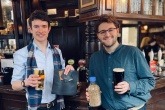New £4m automated sorting plant for waste textiles announced
The UK Fashion and Textile Association (UKFT) is leading the creation of a £4 million automated sorting and pre-processing (ATSP) plant for non-rewearable textiles (NRTs) with the potential to divert tens of thousands of tonnes of waste textiles from landfill each year.
 The two-year project – the Autosort for Circular Textiles Demonstrator (ACT UK) – aims to support the transition from manual sorting to automated sorting and pre-processing, the output of which can then be used as feedstock for existing and emerging textile recycling processes.
The two-year project – the Autosort for Circular Textiles Demonstrator (ACT UK) – aims to support the transition from manual sorting to automated sorting and pre-processing, the output of which can then be used as feedstock for existing and emerging textile recycling processes.
The project brings together recycling technologies, textile collectors and sorters, academia, manufacturers, industry associations, technologists, and brands and retailers – all supported with funding from Innovate UK.
It forms part of the larger Circular Fashion Programme supported by Innovate UK, the Arts and Humanities Research Council (AHRC) and the Natural Environment Research Council (NERC), all part of UK Research and Innovation (UKRI). It is also a part of Creative Industries Sector Vision announced by the Secretary of State for Digital, Culture, Media and Sport, The Rt Hon Lucy Frazer KC MP, on 14 June.
ACT UK will build on automated sorting approaches that are currently coming to market in countries such as the Netherlands, Spain and Sweden. It says that its approach will innovate, combine and advance existing and new supporting technologies to overcome current barriers to materials circularity.
Project partners include IBM, Marks & Spencer, Tesco, Pangaia, Reskinned, Salvation Army, Oxfam, Textile Recycling International, Shred Station, Worn Again Technologies, English Fine Cottons, Alex Begg, Camira, Manufacturing Technology Centre, University of Leeds, University of Huddersfield, Textile Recycling Association and WRAP. It is supported by Circle-8 Textile Ecosystems.
Brands, retailers, platforms, recyclers and any other producers of textiles or garments who are interested in participating in the project are invited to reach out to UKFT at [email protected].
Adam Mansell, CEO of UKFT, said: “What happens to our textiles when we no longer need them is a growing problem that we cannot ignore. With this ground-breaking project, we’re aiming to create a model to sort and prepare NRT for recycling in a way that’s never been done before, at scale.
“A national system of recycling plants could save 100,000s of tonnes of material from entering landfill. In turn, the system could generate huge volumes of material for use across the UK textile manufacturing sector.”
In the UK, over one million tonnes of used textiles are generated annually. Estimates suggest that a third of these are NRTs which are currently being lost to landfill/incineration or are being exported, to be sorted in lower-cost labour regions.
Harriet Lamb, CEO of project partner WRAP, commented: “We welcome this ground-breaking initiative. An automated sorting and pre-processing plant for NRTs will bring us a step closer to commercialised fibre-to-fibre recycling in the UK, and a step away from our reliance on virgin raw materials.
“Textiles is fourth behind housing, transport, and food in terms of the environmental damage it causes, and this important consortium will help lighten the footprint left by our clothes.
“We are excited to work with UKFT, Innovate UK and members of our Textiles 2030 voluntary agreement in supporting this bold endeavour which will bring us closer to a much-needed circular economy for textiles.”
Lamb was recently announced as the United Nations’ Champion 12.3 for her work as CEO of WRAP. Champions 12.3 is an international coalition of executives from across governments, businesses, international organisations, research institutions, farming groups and civil society dedicated to ‘inspiring ambition, mobilising action and accelerating progress’ to deliver the UN’s Sustainable Development Goal Target 12.3.
The goal aims to halve per capita global food waste at the retail and consumer level and reduce food losses across production and supply chains, including post-harvest losses, by 2030.









